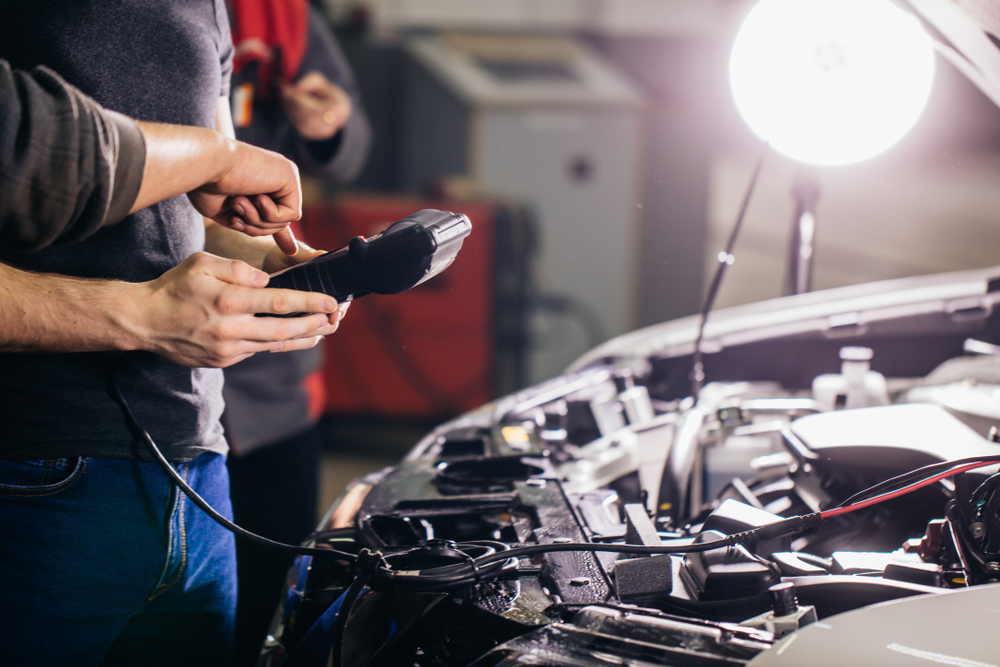If you've encountered difficulties starting your car or keeping it running, the battery or alternator might be the problem. Avoid getting stranded by understanding how batteries and alternators function together, how to identify if one has failed, and how to tell the difference between a bad battery and a bad alternator.
Batteries and Alternators: What’s the Difference?
Both your battery and alternator provide power, but they serve different purposes during vehicle operation. Let's explore their distinct roles.
How Do Car Batteries Work?
Your car's battery is like a caffeine boost – it delivers the necessary energy to start your vehicle. The battery sends power to the starter, ignition coil(s), and other crucial components when you turn the key. However, batteries alone can't keep a vehicle running for long, which is where the alternator steps in.
Why Do Cars Need Alternators?
Once your car is running, the alternator recharges the battery and powers most of the vehicle's electrical components. It transforms rotational mechanical energy into electrical energy through a belt and pulley system. Inside the alternator, magnets attached to the rotor rotate within the stator, generating DC electricity and resolving the issue of limited battery capacity.
How to Identify A Faulty Battery or Alternator
It's essential to recognize signs of a failing battery or alternator to prevent disruption to your routine (and wallet). Knowing the symptoms will make troubleshooting much easier.
Signs of A Bad Battery
Standard car batteries typically last three to five years. Extended periods without a charge or exposure to extreme temperatures can reduce their lifespan.
Be on the lookout for these indicators of a failing battery:
- Clicking sound when starting the engine
- Slow Cranking, sounding like "rurr, rurr, rurr"
- Check engine or battery light on the dashboard
- Swelling or bloating of the battery case
- Sulfur or rotten-egg smell - replace leaking batteries immediately!
Quick Tip: If the battery tests fine but the engine struggles to start, check for corrosion on wires and terminals. Cleaning with a wire brush or sandpaper may help. If not, the starter could be at fault, so consider these five signs of a bad starter before replacing the battery. Consult a professional if you don't feel comfortable doing this on your own.
Signs of A Bad Alternator
Alternators generally last longer than batteries but can fail early due to water exposure, excessive heat or load, and faulty components.
Be aware of these symptoms of a bad alternator:
- Battery dashboard light is on
- Low or abnormally high voltage gauge readings while driving (if equipped)
- Repeatedly dead batteries
- Dim or overly bright lights
- Underpowered or malfunctioning accessories (windows, radio, seat warmers, etc.)
- Whining, grinding, or growling noises under the hood
- Burning rubber smell
Determine if It's A Battery or Alternator Issue
To tell if it's a battery or alternator issue, observe the following:
Dashboard warning lights: A failing alternator often triggers a battery-shaped warning light on the dashboard, while a bad battery may not trigger any warning lights.
Jump-start test: Connect jumper cables from a running vehicle's battery to yours. After a few moments, try starting your car. If it starts and then stalls after removing the cables, the alternator is likely the issue. If it continues running, the battery is probably the problem.
Headlights test: Turn on your car's headlights and observe their brightness. If they appear dimmer than usual, it could indicate a failing alternator. However, if the headlights don't turn on at all or are excessively dim, the battery could be at fault.
Voltage test: Use a multimeter to check the voltage of your battery with the engine off. A healthy battery should read around 12.6 volts. Next, start the engine and check the voltage again – it should now read between 13.7 and 14.7 volts. If the voltage remains low, the alternator might be the issue. If the voltage is within the expected range but the battery still struggles, it's likely a battery problem.
When to Seek Help From A Professional
If you experience any of these symptoms or reach the manufacturer-suggested maintenance limit, turn to the expert technicians at Kunes Ford of East Moline's Service Center. The best way to determine which component is causing the issue is through a professional inspection. Our team will even help you find a new battery or alternator if needed.
Don't hesitate to schedule your appointment today and take charge of your vehicle's electrical system!

